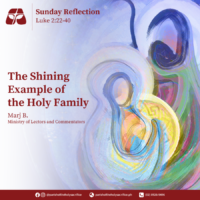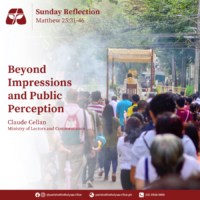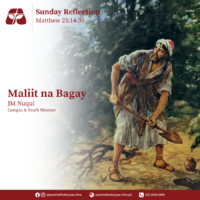Reflection on the Seventeenth Sunday in Ordinary Time
July 28, 2019
“Not my will but yours be done”
Rex Lago Paras
Chapter 11 of the Gospel of St. Luke is proclaimed to us on this Seventeenth Sunday in Ordinary Time. Specifically, the text is Luke 11:1-13. The passage is a treatise on prayer. It is especially familiar to us because of the actual prayer embedded in the reading. When one of Jesus’ disciples asked him to teach them to pray, he replied by providing a very concrete model—that which we now know as the Lord’s Prayer or the Our Father.
The Lord’s Prayer or the Our Father is the perfect example of what our prayer should be. Through it, Jesus himself laid down the elements of Christian prayer which include, among others, adoration, supplication and penitence. As Catholics, we know the prayer by heart and recite it as part of many devotions, such as the Holy Rosary. We pray it each time we offer the Holy Mass. This beautiful prayer, taught to us by Jesus himself, affirms that “[we] received a spirit of adoption, through which we cry, “Abba, Father!” (Rom 8:15) From the very beginning of the prayer, we express ‘our’ communion with our sisters and brothers and ‘our’ filial trust in ‘our’ heavenly ‘Father.’ (cf. Catechism of the Catholic Church 2861)
Yet, despite the assurance that we are children of God, we, at times, lose sight of this relationship and falter in our prayer-life. Knowing our predisposition to waver, Jesus continues his teaching on prayer by telling his disciples and us the story of the one who goes to his friend at midnight to ask for three loaves of bread. (Lk 11:5-6) The friend initially refuses to give him any bread and asks not to be bothered (Lk 11:7), but Jesus ends the story with an important lesson, “I tell you, if he does not get up to give him the loaves because of their friendship, he will get up to give him whatever he needs because of his persistence.” (Lk 11:7)
And so it is with praying. In this day and age when we can avail ourselves of information, goods and services with a click of a button, we easily become impatient when we do not get results in an instant. Sadly, we bring this same attitude to our prayer-life. We pray, but when it seems to us that God is not listening or is taking a long time to respond to our prayer, we get tired of praying and lose our patience. It is in these moments that we need to remind ourselves of Jesus’ lesson on persistence in praying. Again, Jesus assures us, “ask and you will receive, seek and you will find; knock and the door will be opened to you. For everyone who asks, receives; and the one who seeks, finds; and to the one who knocks, the door will be opened.” (Lk 11:9-10) To further illustrate that there are no unanswered prayers with our heavenly Father, Jesus makes this comparison, “What father among you would hand his son a snake when he asks for a fish? Or hand him a scorpion when he asks for an egg? If you then, who are wicked, know how to give good gifts to your children, how much more will the Father give the holy Spirit to those who ask him?” (Lk 11:11-13) With Jesus himself assuring us of the Father’s generosity, how can we doubt it?
Aside from our doubts and lack of persistence, another dangerous attitude that we bring to our prayer-life is our sense of entitlement, which is the other extreme in the equation. We doubt because we tend to forget Jesus’ assurance that we are children of God and that our heavenly Father will not forsake us. On the other hand, there is also the temptation of taking to the extreme our status as heirs of the kingdom of God. With the knowledge that we are sons and daughters of the heavenly Father, it quite easy to fall into the trap of thinking that God owes us. We are reminded over and over again that we are the most important of God’s creation so much so that we have been created in his own image and likeness and we have been given dominion over the rest of creation (Cf. Gen 1:26). While this is true, it should never been an excuse to abuse the kindness of the Father. When the temptation is hovering above us, let us remind ourselves of Jesus’ example.
Jesus, the only begotten son of God, could have invoked his oneness with the Father to escape his bitter passion and death. However, during his agony in the garden, his prayer was, “Father, if you are willing, take this cup away from me; still, not my will but yours be done.” (Lk 22:42) This is reminiscent of Mary’s fiat when the angel Gabriel announced to her the birth of Jesus. The news “greatly troubled” (Lk 1:29) Mary, but when the angel explained that “nothing will be impossible for God,” (Lk 1:37) she willingly allowed herself to be part of our salvation history and said, “Behold, I am the handmaid of the Lord. May it be done to me according to your word.” (Lk 1:38)
In mother and son, we see letting the hand of God do its work, which is precisely the disposition we should have when praying. Let us pray for the grace to follow the example of Jesus and Mary. On this Sunday and every time we pray especially the Our Father, may we take to heart the lines, “thy kingdom come, thy will be done” and let the will of the Father take its course in our lives.


